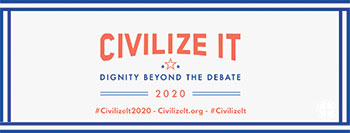Week three: ‘Pray, Learn and Act as Faithful Citizens’
 Compiled by the archdiocesan Office of Human Life and Dignity and the Social Concerns Ministry
Compiled by the archdiocesan Office of Human Life and Dignity and the Social Concerns Ministry
The archdiocesan Office of Human Life and Dignity and Catholic Charities-Social Concerns are collaborating to offer the third of seven weeks of prayer, study and action as the nation prepares for an upcoming election.
This week, we continue to explore the teaching document from the United States Conference of Catholic Bishops, “Forming Consciences for Faithful Citizenship.” This week’s column will briefly look at Part I: The U.S. Bishops’ Reflection on Catholic Teaching and Political Life.
Pray
Merciful Father,
Thank you for inviting each of us to join in your work of building the kingdom of love, justice and peace. Draw us close to you in prayer as we discern your call in our families and communities. Send us forth to encounter all whom you love: those not yet born, those in poverty, those in need of welcome. Inspire us to respond to the call to faithful citizenship, during election season and beyond. Help us to imitate your charity and compassion and to serve as models of loving dialogue. Teach us to treat others with respect, even when we disagree, and seek to share your love and mercy. We ask this through Jesus Christ our Lord, who lives and reigns with you in the unity of the Holy Spirit, one God forever and ever. Amen.
Learn
“The Church equips its members to address political and social questions by helping them to develop a
well-formed conscience. Catholics have a serious and lifelong obligation to form their consciences in accord with human reason and the teaching of the Church. Conscience is not something that allows us to justify doing whatever we want, nor is it a mere ‘feeling’ about what we should or should not do. Rather, conscience is the voice of God resounding in the human heart, revealing the truth to us and calling us to do what is good while shunning what is evil.” (From “Forming Consciences for Faithful Citizenship,” Part I: The U.S. Bishops’ Reflection on Catholic Teaching and Political Life, #17)
“The formation of conscience includes several elements. First, there is a desire to embrace goodness and truth. For Catholics, this begins with a willingness and openness to seek the truth and what is right by studying sacred Scripture and the teaching of the Church as contained in the Catechism of the Catholic Church. It is also important to examine the facts and background information about various choices. Finally, prayerful reflection is essential to discern the will of God. Catholics must also understand that if they fail to form their consciences in the light of the truths of the faith and the moral teachings of the Church, they can make erroneous judgments.” (“Forming Consciences for Faithful Citizenship,” Part I: The U.S. Bishops’ Reflection on Catholic Teaching and Political Life, #18)
“Catholics often face difficult choices about how to vote. This is why it is so important to vote according to a well-formed conscience that perceives the proper relationship among moral goods. A Catholic cannot vote for a candidate who favors a policy promoting an intrinsically evil act, such as abortion, euthanasia, assisted suicide, deliberately subjecting workers or the poor to subhuman living conditions, redefining marriage in ways that violate its essential meaning, or racist behavior, if the voter’s intent is to support that position. In such cases, a Catholic would be guilty of formal cooperation in grave evil. At the same time, a voter should not use a candidate’s opposition to an intrinsic evil to justify indifference or inattentiveness to other important moral issues involving human life and dignity.” (From “Forming Consciences for Faithful Citizenship,” Part I: The U.S. Bishops’ Reflection on Catholic Teaching and Political Life, #34)
Act
Read Part I of “Forming Consciences for Faithful Citizenship,” and discuss it with a friend or small group. In order to continue the work of forming the conscience, “prayerful reflection is essential to discern the will of God.” Use the prayer listed above before reading and discussing the document. Be open to the guidance of the Holy Spirit for enlightenment of God’s truth.
(To access “Forming Consciences for Faithful Citizenship” in English and Spanish, go to tiny.url/USCCBFormingConsciences. For more information, including tips for engaging in civil dialogue, go to
www.civilizeit.org.) †
